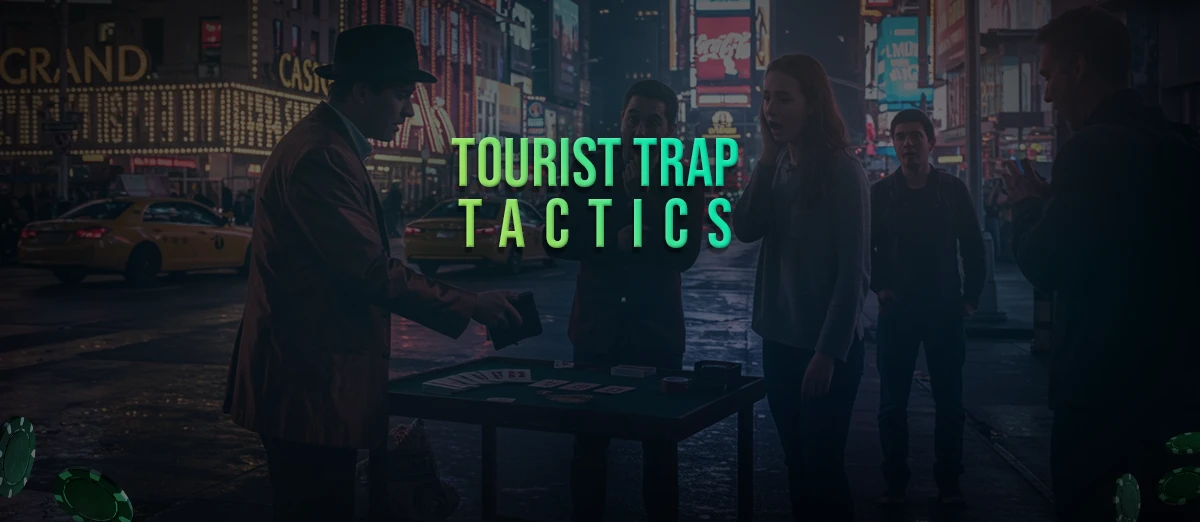R Paul Wilson On: How to Avoid New York Street Scams

One of the perks of traveling frequently is the opportunity to explore both new and familiar places firsthand, always setting aside some time for what I call ‘scamwatching.’ This involves wandering the streets, scanning local news, and soaking up the atmosphere to gauge the risks in each area.
It’s more than just an intellectual pursuit; I often uncover fresh variations of street scams. Some trips yield more insights than others, but New York City never disappoints and as (arguably) the North American hub of deception, it offers a treasure trove of cons that can enlighten and prepare us for similar schemes elsewhere.
I have a love/hate relationship with NYC—I’m captivated by the city’s energy but quickly need a break from the constant hustle. I admire the creativity and art scene but soon grow weary of the attitude and arrogance that pervade the New York ‘scene.’ New Yorkers take pride in their cynicism, believing they—and their city—are the pinnacle of achievement, hardened by two centuries of rough history. And they’re hard to hustle.
A New York Crash Course in Street Scams
Ask any New Yorker, and they’ll boast about avoiding countless scams because, in Manhattan, you either learn fast or get fleeced daily. The city is rife with grifters, but the real targets are outsiders: tourists, newcomers, and the occasional know-it-all who think they’re immune to deception. What irks me most is how often New Yorkers are right! They really do know how to spot and dodge scammers, but with an endless stream of out-of-towners, scams like the pig butchering scheme are picking up steam, while locals continue to roll their eyes at the gullibility of others.
About ten years ago, I spent two weeks in New York City alone, bouncing from meeting to meeting, socializing with friends, and discovering new places to eat while writing in my apartment, hotels, and cafes. During that time, I was able to blend in seamlessly, moving through the city like a local. But when my family joined me for a vacation, the dynamic changed instantly—I became a prime target for every scam and hustle imaginable.
It started the moment we left the airport. Our taxi driver tried to overcharge us, claiming the flat rate only applied in one direction. Then, every time we hit the streets, we were approached by people trying to run some angle on us. Even a routine trip on the subway turned into a disaster when we took the wrong train and suddenly found ourselves like magnets for trouble until we managed to get back on track. The difference was clear: alone, I could blend in, but with my family, we were obvious tourists—blood in the water for local sharks.
The relentlessness of these encounters made me wonder if anyone could fend off grifters forever. I remembered a security video of a family at a European airport, vigilantly guarding their bags while a group of local thieves tried, unsuccessfully at first, to distract them. The thieves finally succeeded by tossing loose change on the ground, and as the family instinctively turned to pick up coins, their bags were snatched.
It doesn’t matter who you are or what part of the world (including New York) you grew up in; if you’re constantly under threat, eventually, one of those threats is going to get through unless you keep one eye on what the latest threats might be. With that in mind, lets see what scams are thriving in New York to prepare our minds for similar cons we might encounter around the world.
From Monks to Monte: How to Spot and Dodge Scammers
Here’s a list of some prevalent scams in New York City, along with some advice you should already know but it never hurts to be reminded that these can happen to us or people we care about:
Fake Products: Vendors sell counterfeit goods like designer bags, watches, and electronics at "bargain" prices. We see these bogus products everywhere, even in seemingly prestigious locations. The rule is simple: if it’s cheap, it’s almost certainly a fake, no matter how much you want it to be real.
Venmo Scams: Scammers pretend to collect donations or take payment via Venmo and ask to borrow your phone to add their email, usually a deliberately complicated one. They then increase the transaction amount and send it before hustling you away. Never hand your phone to anyone, especially with a payment app open—some scammers even snatch devices from victims’ hands before they can protest.
Parking Ticket Scam: Fraudsters place fake parking tickets on cars, directing victims to pay through non-official channels. Always double-check any fines by visiting the local authority’s website, not by following links on the ticket. In NYC, tourists tend not to need cars but this scam exists all over the world.
Overcharging Stores/Bodegas/Street Carts: Vendors overcharge tourists, especially when paying with credit cards. This scam might seem minor, but over time, it can add up. If prices aren’t posted, it’s best to avoid altogether.
Tour Scams: Fake or overpriced tours promise exclusive experiences but deliver poor service. This is common worldwide, and while online reviews used to help, fake reviews and bogus websites are harder to spot. Rely on local knowledge, such as a hotel concierge, but avoid booking through them to skip hefty commissions.
Free Ferry Scam: Con artists sell fake tickets for the Staten Island Ferry, which is actually free. This scam highlights how easy it is to take advantage of tourists’ lack of local knowledge.
Airport Scams - Taxi Cons: Unauthorized drivers overcharge or take longer routes; fake Uber drivers lure passengers into unlicensed vehicles. Stick to official taxis or pre-arranged rides and avoid accepting rides from random drivers at the airport.
Times Square Fake Monks: Individuals dressed as monks ask for donations in exchange for cheap trinkets or blessings. Similar scams happen worldwide, where someone offers you something and then pressures you for payment. Whether it’s old ladies with dried heather or CD sellers, the strategy is the same: refuse the item and walk away.
Three-Card Monte: A classic street scam where victims are tricked into betting on which card is the "winner," but it’s rigged from the start. Stay away from any street gambling games—you’ll either lose money or get pickpocketed.
Fake Mascot Characters: People in knockoff costumes charge exorbitant fees for photos with tourists. Always agree on a price before taking a photo, but be wary, as some will still demand more or ask for a "tip." Venmo scams are common here, too, particularly in places like Las Vegas.
Dropped Food/Medicine/Watermelon Scam: A scammer "accidentally" drops food or goods near a victim, demanding payment for the “damages." This scam relies on making you uncomfortable enough to pay to resolve the situation. The best response is to get away quickly or offer to call the police. Fear of physical violence is a real concern, so escaping to a public space is advisable.
Fake Story Scammers (In Elevator): Con artists share sob stories in confined spaces like elevators, asking for money to help with a fabricated emergency. This classic swindle is more potent in places where you can’t easily escape. Politely decline and move on with your day, regardless of their tale or any dreadful curses they might toss at you.
There are other scams, but these are the ones most likely to affect you when visiting New York.
Why Street Smarts Matter Everywhere
The point isn't just to prepare you for a weekend in the Big Apple, but to emphasize how these “tourist traps” and scams are common across many major cities worldwide—especially those with heavy tourist traffic. From New York to Paris, Bangkok to Las Vegas, con artists thrive on unfamiliarity and distraction.
Whether you're traveling for business, pleasure, or even a quick gambling getaway, it’s standard practice to research local restaurants, sights, and cultural norms. So why not also take a few minutes to look up common scams in the area? A little awareness can go a long way in protecting your money, safety, and peace of mind.
Of course, this mindset shouldn’t be limited to travel. The same principles of awareness and preparation apply to everyday life—especially as we move into an era increasingly shaped by digital threats. With that in mind, we’ll now explore how online scams are evolving and what you can do to stay ahead.





Review this Blog
Leave a Comment
User Comments
comments for R Paul Wilson On: How to Avoid New York Street Scams